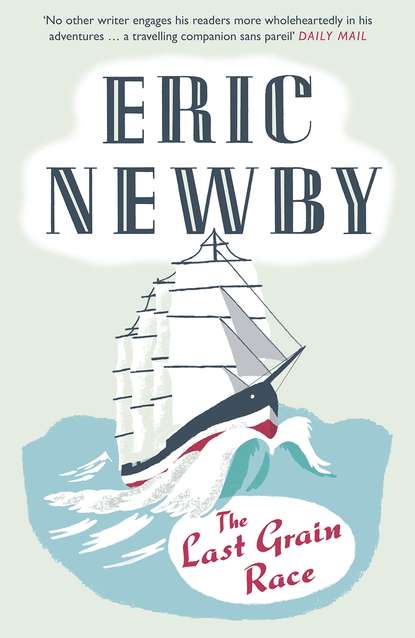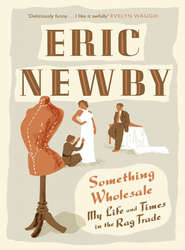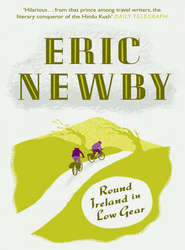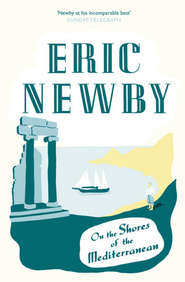По всем вопросам обращайтесь на: info@litportal.ru
(©) 2003-2024.
✖
The Last Grain Race
Настройки чтения
Размер шрифта
Высота строк
Поля
Beneath the bridge-deck, in the forepart, were the port and starboard fo’c’sles with the galley in between them; the Petty Officers’ cabin, which housed Carpenter, Donkeymen, and the Sailmaker’s assistant, who normally worked by day; and the Sailmaker’s loft. In the after part were the six rooms of the Master’s accommodation – saloon, bathroom, cabin, etc – spare room for guests – and the Officers’ quarters, also the accommodation for the Steward and Cook. The Steward, Steward’s boy and Cook lived aft but helped to work the ship, and even went aloft when the necessity arose.
Short ladders to port and starboard led down to the 130-foot long main deck, where the ports of the Captain’s saloon amidships faced on to No 3 hatch. By the mizzen mast was another Jarvis winch for the mainbraces, the mizzen halliard winches and the main pumps. On either side of it were skids supporting the ship’s motor-boat and a gig. Farther aft, to port and starboard, were two sets of davits each supporting a lifeboat. Between them was the standard compass on a raised platform, level with the flying bridge and connected with it, a henhouse on skids above the deck, No 4 hatch, a freshwater tank, just before the break of the short poop and the jigger mast with the mizzen brace winch. On the poop was the patent sounding machine, a capstan and the spare kedge-anchor.
Beneath the poop was the entrance to the after peak where the stores were kept. It was covered with a grating, heavily padlocked. Also under the poop was a pair of auxiliary wheels which could be connected to the steering-gear if the cables parted; there was also a binnacle with a compass card that displayed the most extraordinary abberrations. The helmsman’s head projected right through the deck, but he was so walled-in by a curved steel coaming above and on either side that only a very imperfect view aloft could be had through the glass window in the front of it. There were six compartments under the poop. Two were originally intended for the apprentices, one was appropriated by the Sailmaker as a cabin in cold weather, another served the Carpenter as a workshop.
The bulwarks on the fore-well and main decks were shoulderhigh and fitted with steel doors at intervals, hinging outwards from the top. These freeing ports enabled the water to drain off when the ship took a heavy sea. They made an abominable din and ropes were often washed off belaying pins and jammed in them.
All the slack of running rigging was coiled down on these belaying pins. There were a couple of hundred pins with some 300 lines belayed to them, some miles of hemp, wire and chain. As no sails were bent aloft, they seemed mystifying and without purpose.
All this I learned from Vytautas.
‘The higher the gear, the farther aft, is the rule,’ he said. ‘You see, it’s quite easy.’
‘I don’t.’
‘You know the names of all the yards?’ asked Vytautas.
‘Yes,’ I said. I thought I did.
‘But do you know buntlines from leechlines and clewlines and the difference between a sheet and a tack? You will have to know these things, you will have to know them in Swedish, and you will have to find them at night.’
‘How?’
‘We must see Sömmarström. He’s the Sailmaker and the only one who can help you.’
*
That night I went ashore with Jansson and Vytautas Bagdanavicius to have a ‘liddle trink’. It was the farewell to the boys who were going back to Mariehamn. A steady Ulster drizzle was falling as we came on to the dockside and the cobblestones shone greasily in the glare of the arc lights.
It was a long way to the main gate. We passed a steamer moored astern of us, brilliantly lit, throbbing with the movement of hidden machinery; there was no one about her, no one on the dockside, only a mangy cat scrabbling at a rubbish pile, whilst the rain swished down into the filthy water of the dock. After what seemed an interminable walk, for my feet still ached after the business in the rigging, we arrived at the dock gates, where in addition to the watchman there were two vast Belfast policemen, hard as nails, armed with pistols and long sticks, who eyed us unlovingly. Outside the gate we were on the Donegal Quay where, what now seemed a whole life ago, I had put my trunk in a taxi. Facing us, across the quay, was a wild and woolly-looking pub with its name ‘Rotterdam Bar’ over the door in letters of blood.
Inside, most of the crew had already gathered. Many of them I had never seen. Those I had were unrecognizable in the shore-going uniform, single-breasted blue serge suits of very Teutonic cut and light-coloured caps. In their company the evening passed in a haze. I remember meeting an Englishman called Sowerby who had just completed a round voyage in Moshulu as a passenger. As the evening wore on and people became drunker and spoke more freely I got the impression that the ship had not been very happy or the Captain very popular.
I was unused to beer in large quantities and, downing pint after pint, I quite soon found myself drunk. Leaning my forehead on the brickwork in the lavatory, I remember being sick and groaning to myself: ‘Oh, God, I’m drunk, oh, Christ, I’m drunk, what am I here for?’
There was a lot of singing of a dark, Nordic kind. Then, after a long while, I heard a voice calling ‘Time’. Lights were dimmed and we reeled out into the wet unfriendly night.
Someone suggested that we should dance and we set off down a street of heart-breaking squalor in the direction of a dance hall on the first floor of a building in Corporation Street. We went up a flight of narrow stairs and paid a shilling each to a man who, in any Police Court, would have been described by the Magistrate as a ‘Corrupter of Youth’. The pleasures which we were made free of appeared innocuous enough. The room was large and to the music of a modernist radiogram two or three couples were circling rather gingerly. At intervals the music was drowned by the noise of passing tramcars which swayed past the uncurtained windows like ‘Flying Dutchmen’. The seats round the walls were filled with a lot of girls heavily powdered but well below the age of consent. Some were drinking fizzy lemonade. Most of them looked like schoolgirls who ought to have been in bed asleep by this time after finishing their homework. Soon I was prancing round the room with a big, niffy red-headed girl who was liberally covered with the wrong shade of powder. I tried to talk to her but was relieved to find that she spoke no known tongue. I was very tired.
I was almost glad when a quarrel broke out between one of our crew and one of the natives; chairs were raised and began to fly through the air, the lights went out, there was the crash of glass and a bottle landed in Corporation Street. My partner vanished to join the opposition and soon we were fighting a rear-guard action on the stairs. By the time we reached the street police whistles were trilling merrily.
The march back to the ship was like the ‘Retreat from Moscow’ painted by an elderly spinster. The injured and the incapable were being supported by their companions. Jansson, who was very far gone, was being held up by Vytautas and myself, one on either side.
‘The police will not like this,’ said Vytautas, who was almost sober. ‘I also do not like this place.’
At his suggestion we disengaged ourselves from the main body and made for a different entrance to the dock. Just then Jansson passed out completely and we dragged him forward along the street with his feet scuffling the granite cobbles.
‘We must lift him now,’ said Vytautas, as we came up to the gate. There were the inevitable two policemen, suspicious and broken-nosed. They bore down on us as we hoisted the Wretched Jansson into a vertical, more lifelike position.
‘Where are you going?’ one of them demanded accusingly.
‘Moshulu,’ said Vytautas in a disarming way.
‘What’s the matter with him?’ asked the other, flourishing his great bludgeon in the direction of Jansson whose head unfortunately chose this moment to fall forward with an audible click.
‘He is suffering from overwork,’ I said with drunken insolence, and hiccuped. Nothing seemed to matter any more. Fortunately the policeman failed to understand my English accent. At the same time the drizzle of rain increased to a downpour and they both retired to their hut. Otherwise we should probably have been arrested.
We proceeded on our miserable and interminable way. To reach the Moshulu we had to pass round three sides of the York Dock. On the way we tripped over a hawser in a patch of shadow and nearly dropped Jansson in the water.
At the gangplank we were met by a bedraggled watchman armed with a pick helve who scrutinised us minutely before allowing us on board. Exhausted and wet we reeled into the fo’c’sle and after removing Jansson’s boots, pushed him into his bunk and sought our own. As soon as I lay down on my straw mattress the fo’c’sle began to revolve like a gramophone record. I crawled on deck, barking my shins on all sorts of projections, and sticking my head over the rail, was fearfully sick for the second time. It had been a long, long day.
5 (#ulink_f27cac44-5708-5c0c-8cd7-ef1b090c6b4a)
Over the Side (#ulink_f27cac44-5708-5c0c-8cd7-ef1b090c6b4a)
We were awakened at 5.30 in the morning after our ‘liddle trink’ by a dreadful voice crying, ‘Resa upp, Resa upp.’ This summons with its medieval implications of Hell and Judgment, made me feel like a corpse in a Dürer engraving, and the illusion was sustained when I sat up in the coffin-like bunk and hit my head a great crack on the bedboards of the bunk above.
‘Shot op,’ came an angry voice from the occupant of the upper bunk. I lay still in the stifling blackness until the fo’c’sle door was kicked open and the night-watchman, in oilskins, appeared with a lantern, which he hooked to the ceiling, and a pot of coffee which he banged down on the table. One by one groaning figures began to roll out of their coffins and grovel for boots. From outside came the hiss of rain in the darkness of the too-early morning.
This was to be such an invariable routine, the watchman impatient and bad-tempered after a night on deck, surrounded by the terrors of Belfast that I no longer remember individual days but only that awful first morning.
With two others I was given the job of carrying coal to the galley from the small hatch near the fo’c’sle head. In the coal store by the forepeak we filled great oil-drums with coal, manhandled them in the darkness below decks to the hatch opening, hauled them on deck and carried them to the galley, slung on a capstan bar – hard work for my unpractised arms. We made ten journeys like this before the Cook was satisfied. Afterwards I again cleaned the lavatories.
At eight o’clock came breakfast, which was a mess of pungent beans and very pickled bacon. I was then told to collect a hammer, a pot of red lead and a brush and go over the side forward to chip the rust off the topsides – a job the more experienced and favoured members of the crew had been engaged in since 6 a.m. Rain was still falling steadily. There were already two or three precarious platforms over the side when I got there. They were simply planks with ropes made fast to either end and belayed on deck.
Painting the ship
I do not think it was by design that the platform I inherited was in the most difficult position right over the bows, about two feet above the water. Grimly I lowered myself twenty feet to the platform, to find that it was immediately below the lavatory which I had just cleaned. I began to wish that I had used two or three more buckets of water, and this was a good lesson to me in doing a job thoroughly. At sea one was very likely to find oneself let down by one’s own mistakes. I had not the strength to climb the rope again and shift to a more wholesome area, so I settled down to work where I was.
Set perilously above the dirty waters I first chipped and then red-leaded a large irregular piece of the ship’s side, using red lead from the pot which hung in front of me on a cord. Horizontal movement of the platform was controlled by a system of ropes. In trying to move my platform so that I could work in a fresh and more agreeable situation, and being unable to regain the deck to shift the head-ropes, I inadvertently let slip a clove-hitch which was keeping my platform about four feet to the left of its proper position. The whole construction, thus released, swooped sideways and hit the platform of the man who early that same morning had told me to ‘shot op’ when I hit my head on his bed-boards. He was an able seaman called Sedelquist, made more bad-tempered than usual by the events of the previous evening. The shock of the collision made me drop my hammer in the dock, upset the red lead on Sedelquist’s overalls, and knocked the brush out of his hand. It gave him a bad fright. I had not imagined that he could speak English, as up to now we had not spoken, but he immediately called me a ‘focking
bastard’ and disappeared on deck. Soon he returned with the same Mate who had sent me aloft the day before.
‘What d’you bloody well think you’re doing?’ he shrieked down at me.
‘I’m terribly sorry,’ I replied. This piece of English courtesy was wasted on the Mate. In fact it made him more angry.
‘I’m sorry you’re in this ship. Where’s your hammer?’
‘I’m afraid it’s gone,’ I replied, almost bashfully.
‘Jesus,’ said the Mate. ‘Because you’re English you think you can lose my hammers. I’ll take it off your pay.’
When, months later, I got to Australia and collected part of my pay, amongst the deductions for cigarettes and so on made by the Captain, was my little hammer.
‘You are zorry, I am zorry,’ said Sedelquist, when the Mate had gone, looking at his beautiful dungarees covered with red lead.
My morale, which had been dropping since I arrived in Belfast, fell to new depths. But I was learning. I vowed that I would never again, whilst in the ship, be sorry for anything, and apart from some lapses I managed to keep this resolve. I had been outraged by Sedelquist’s action in rushing on deck to tell the Mate what had happened. Years of school life, happily behind me, told me that by schoolboy standards, Sedelquist had ‘sneaked’. At my prep school he would have been sent to Coventry. Here I seemed to be in danger of suffering the fate which should have been his.











